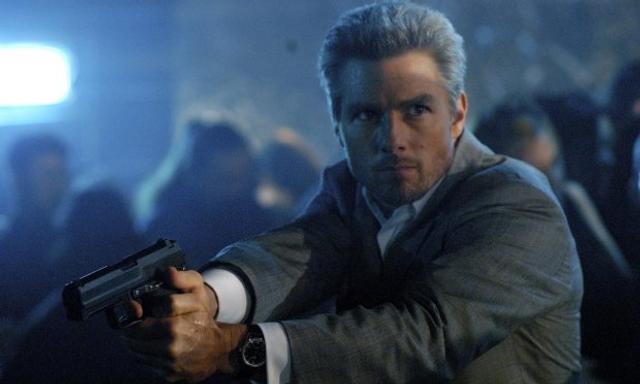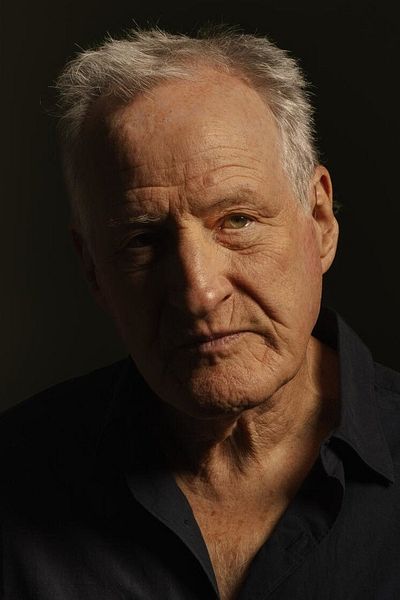Michael Mann is a director that's been marked out by his dedication to authenticity and his ability to hone in on a particular subject with the kind of laser-focus you'd expect from one of his characters.
Although his more recent work has faltered slightly, the incredible body of work he has before him more than makes up a few missteps. Here's our ranking of Michael Mann's work...
11. BLACKHAT (2015)
Michael Mann's work, going all the way back to Thief in 1981, has been about how criminals manage to get away with what they do for so long. It's all about commitment to an ethos, a code, an unbreakable bond that acts as the rock on which they build their careers. He began it with Thief, followed it through with Heat, continued on with Public Enemies and then came to Blackhat. The difference is that crime nowadays is primarily of a computer-based nature. Bitcoins, hacking, it's all done in a virtual world that is extremely difficult to translate into a driving story that will keep audiences interested. Blackhat was praised by many people in the cybersecurity industry as being one of the most factually-correct films, however it didn't make an engaging story. Plus, since when do hackers look like Chris Hemsworth?
10. THE KEEP (1983)
It's pretty difficult to make out exactly what was going in Michael Mann's brain when he directed The Keep. As a story, it's almost incomprehensible. A group of Nazi soldiers arrive at an ancient citadel and wake a demon who drains the essence of the soldiers inside and becomes more and more powerful. Simply put, the film is a mess - but it's not Michael Mann's fault. Locked out of the editing suite once filming was complete, Paramount sliced Mann's vision to ribbons in an attempt to meet a strict two-hour running length. Mann's original version ran for three and a half hours, with the director compromising with Paramount repeatedly on various elements of the story. What's left is a mess, to be sure, but an interesting one. There definitely could have been something truly fascinating in there, however it'll never see the light of day. What a shame.
9. PUBLIC ENEMIES (2009)
John Dillinger. The '30s in America at the height of art deco and the Great Depression. A brilliant story about a folk hero who robbed banks. Public Enemies was the perfect fodder for Michael Mann. It was going to be Heat set in the '30s. Instead, it was something much more closer to a romance story with a crime saga playing in the background. The chemistry between Johnny Depp and Marion Cotillard was too potent not to make it the focus of the film, however it robbed the film of any kind of alacrity. Not only that, Mann's use of digital cameras meant that the film looked closer to a home movie than a film crafted by a master director.
8. MIAMI VICE (2006)
You're probably seeing a pattern through all these, aren't you? Mann's got a great idea, but either gets wrapped in the details of it all or gets hamstrung by the studio. In Miami Vice's case, Mann was hamstrung by his actors - specifically Jamie Foxx, who was coming off the back of his Oscar-winning performance in Ray. Mann's commitment to authenticity meant that the film crew moved to Dominican Republic. While on set, live gunfire went off with Foxx refusing to continue filming. What's more, Foxx refused to participate in scenes involving boats or planes and refused to fly commercially, meaning Universal had to stump up for a private jet. All this conspired coalesced on set, with Mann having to rewrite vast swathes of the script. Many of the crew members on set reported that Mann's original script was much, much more dramatic. Again, what a shame.
7. ALI (2001)
Arguably Will Smith's greatest performance since that scene in Fresh Prince of Bel-Air when his father walks out on him (seriously, look it up), his embodiment of Muhammad Ali was the centrepiece of Mann's one and only foray into sports movies. Sure, he also had HBO's Luck - which had anything but. However, Ali was a chance for Mann to use that same intense focus and commitment to realism on the most iconic boxer of all time. At a running length of 157 minutes - two hours and thirty-seven minutes - you feel every punch, every wallop and every knockout in Ali. That, in itself, is the curse. Mann took on more than he could manage, crafting a huge scope and realising it as best he could. While it's the not the best boxing film of all time - that would go to When We Were Kings - it does offer a fascinating perspective on the sport and how the politics of the time interspersed with Ali's own life.
6. LAST OF THE MOHICANS (1992)
Casting someone as devoted and committed as Daniel Day-Lewis on a film directed by Michael Mann, arguably the director's equivalent to Day-Lewis, should have resulted in something deep, esoteric and watched only in stuffy arthouses. Instead, Last of the Mohicans is a rip-roaring matinee adventure that scored huge acclaim from audiences and critics alike upon its initial release. The sweeping epic of the French and Indian War and its toll on the Native American populace benefited greatly from career-best performances from Wes Studi as the vengeful Magua and Daniel Day-Lewis. The gorgeous cinematography and the soaring score by Trevor Jones, coupled with the tragic tale of a dying way of life, will stay with you for days. Here's a quick blast of that soundtrack.
5. THIEF (1981)
Mann's first film, having worked successfully in television for several years, really works as showing exactly what Mann could do with a reasonable budget and a clear vision. In fact, the film serves as a calling card for his later work. There's the emotionally unavailable central character, here played by James Caan. You have the incredible attention to detail; Mann hiring actual jewel thieves to consult on how to expertly rob from a safe. You also had the pulsing electronic soundtrack by Tangerine Dream, whom he'd work with again on The Keep. Thief also marked the first film appearances of Robert Prosky, Dennis Farina, James Belushi and William Petersen. A highly intelligent, effortlessly stylish crime thriller.
4. MANHUNTER (1986)
Dismissed somewhat on its release as all style and no substance, it's impossible not to look at Manhunter and see the huge influence it had on crime thrillers. The X-Files, CSI, Millennium, David Fincher's Se7en and countless more all owe a huge debt to what Mann did with Manhunter. Turning a pulpy airport novel into a stylish, neon-drenched horror with arthouse flair and visuals, Manhunter has rightly been reassessed as one of the finest horror thrillers ever made. Granted, William Petersen's performance is somewhat stilted and the visuals can become oppressive, it all adds to the experience of watching Manhunter. It's supposed to put you on edge, it's supposed to make you feel queasy and under siege.
3. COLLATERAL (2004)
To date, Collateral is the only film Michael Mann has worked on where he was not also the writer. Yet, the story is vintage Mann. An average taxi driver innocently picks up a contract killer from Los Angeles International Airport and is drawn into his murderous plans and held hostage for the night. The first film to extensively use digital cameras - except for the excellent club scene - Mann again used his eye for expert casting by bringing on Tom Cruise. The actor applied himself fully to the role, both physically and mentally, and created one of his most iconic performances. The fantastic supporting cast of Mark Ruffalo, Jada Pinkett-Smith and a then-unknown Javier Bardem, all worked together to create arguably the best crime thriller of the '00s.
2. THE INSIDER (2001)
Russell Crowe's performances are rarely described as narrowed, human and measured. We think of Gladiator or Master & Commander, screaming at the top of his lungs in a period costume over a sea of people. With The Insider, Crowe gave the best performance of his career as Jeffrey Wigand, a high-level executive for a Big Tobacco company who agrees to speak on the record to 60 Minutes about their practices. In doing so, he invokes the wrath of Corporate America and the legal system whilst Al Pacino's producer tries to battle off CBS' intransigence with sharing the story. The film is split in two, Crowe battling with himself to tell the story and Pacino battle the powers to tell everyone else the story. It's a fascinating film about how ordinary people react to extraordinary pressure. Dark, cynical and fully realised, The Insider is a bleak tale about how telling the truth doesn't always set you free.
1. HEAT (1995)
What can be said about Heat that hasn't already been said? It features two of the finest actors of their generation at the peak of their powers and a director at the height of his creative zenith. Together, they create the greatest crime film of the last twenty years, bar none. What's so interesting about Heat is that, while it may be about two opposites of the same coin, it's really about the cost of being the best at what you do - something Mann has addressed several times over in his career. Pacino is on the downward slope of his third marriage whilst DeNiro lives a monastic life without attachments to anyone. Manhunter saw Petersen haunted by his ability to think like a murderer whilst The Insider saw Crowe paying the price for his principles. So few films nowadays have that kind of layered subtext. Drenched in style and blistering action sequences, Heat is an undisputed masterpiece.


















































































